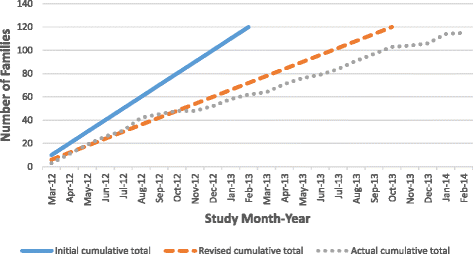Evaluation of recruitment methods for a trial targeting childhood obesity: Families for Health randomised controlled trial
- PMID: 26607762
- PMCID: PMC4660776
- DOI: 10.1186/s13063-015-1062-x
Evaluation of recruitment methods for a trial targeting childhood obesity: Families for Health randomised controlled trial
Abstract
Background: Recruitment to trials evaluating the effectiveness of childhood obesity management interventions is challenging. We report our experience of recruitment to the Families for Health study, a randomised controlled trial evaluating the effectiveness of a family-based community programme for children aged 6-11 years, versus usual care. We evaluated the effectiveness of active recruitment (contacting eligible families directly) versus passive recruitment (informing the community through flyers, public events, media).
Methods: Initial approaches included passive recruitment via the media (newspapers and radio) and two active recruitment methods: National Child Measurement Programme (letters to families with overweight children) and referrals from health-care professionals. With slow initial recruitment, further strategies were employed, including active (e.g. targeted letters from general practices) and passive (e.g. flyers, posters and public events) methods. At first enquiry from a potential participant, families were asked where they heard about the study. Further quantitative (questionnaire) and qualitative data (one-to-one interviews with parents/carers), were collected from recruited families at baseline and 3-month follow-up and included questions about recruitment.
Results: In total, 194 families enquired about Families for Health, and 115 (59.3 %) were recruited and randomised. Active recruitment yielded 85 enquiries, with 43 families recruited (50.6 %); passive recruitment yielded 99 enquiries with 72 families recruited (72.7 %). Information seen at schools or GP surgeries accounted for over a quarter of enquiries (28.4 %) and over a third (37.4 %) of final recruitment. Eight out of ten families who enquired this way were recruited. Media-led enquiries were low (5 %), but all were recruited. Children of families recruited actively were more likely to be Asian or mixed race. Despite extensive recruitment methods, the trial did not recruit as planned, and was awarded a no-cost extension to complete the 12-month follow-up.
Conclusions: The higher number of participants recruited through passive methods may be due to the large number of potential participants these methods reached and because participants may see the information more than once. Recruiting to a child obesity treatment study is complex and it is advisable to use multiple recruitment strategies, some aiming at blanket coverage and some targeted at families with children who are overweight.
Trial registration: Current Controlled Trials ISRCTN45032201 (Date: 18 August 2011).
Figures
References
-
- Story M, Sherwood NE, Obarzanek E, Beech BM, Baranowski JC, Thompson NS, et al. Recruitment of African-American pre-adolescent girls into an obesity prevention trial: the GEMS pilot studies. Ethnicity and Disease. 2003;13:78–87. - PubMed
-
- Waters E, de Silva-Sanigorski A, Burford BJ, Brown T, Campbell KJ, Gao Y, et al. Interventions for preventing obesity in children (review). Cochrane Database Syst Rev 2011. Dec. doi: 10.1002/14651858.CD001871.pub3. - PubMed
Publication types
MeSH terms
Associated data
Grants and funding
LinkOut - more resources
Full Text Sources
Other Literature Sources
Medical


